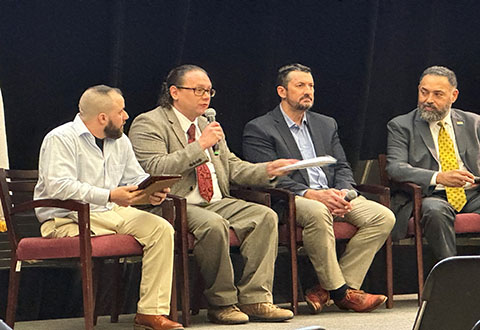Attention A T users. To access the menus on this page please perform the following steps.
1. Please switch auto forms mode to off.
2. Hit enter to expand a main menu option (Health, Benefits, etc).
3. To enter and activate the submenu links, hit the down arrow.
You will now be able to tab or arrow up or down through the submenu options to access/activate the submenu links.
Locator
Contact
Search
VA »
Health Care »
VA Mid-Atlantic Health Care Network
»
Suicide Prev. Panel Includes Durham Social Worker
VA Mid-Atlantic Health Care Network
Suicide Prev. Panel Includes Durham Social Worker

NC Governors Working Group Suicide Prevention Panel, left to right Derrick Sharpe, Lucas Vrbsky, Chris Budnick, Hon. Lou Oliveira, Hon. Angel Menendez
By Steve Wilkins, VISN 6 public affairs
Thursday, February 8, 2024
A panel recently shared their perspectives on improving suicide prevention among substance abusers with Veteran Stakeholders during a meeting of the North Carolina Governor’s Working Group at North Carolina State University’s McKimmon Center. Lucas Vrbsky, a Veterans Justice Program Social Worker at the Durham VA Medical Center added some historical context before expounding on his experience helping Veterans in the field, saying that America has tried to address the issues connected to substance abuse since the Civil War, mostly by addressing issues of race and class instead of health and safety, and surmising, not really getting very far with effectiveness as a result. “We have to stop stigmatizing and criminalizing the issue,” he said.
To his point, Chris Budnick, executive director of Healing Transitions in Raleigh, NC, shared that not too long ago a policeman used an overdose emergency in his facility to run the names of others and make arrests. He indicated such activities make it difficult to establish or keep the trust of those desperately in need of his help. It’s part of the dichotomy that Vrbsky says has a history preventing success, especially with Veterans, that can bring some individuals very close to the end.
Another panel member, disabled Marine Derrick Sharpe related how close he came because the country he served didn’t listen to him, sending him “spiderballing” into a spiral of anger, violence and suicidal ideation. He said, “It broke my heart.”
Judge Lou Oliveira, a Veteran himself and Director of the Cumberland County Veteran Treatment Court, said these examples hit the root of the problem, that if we are to successfully address Veteran Suicide Prevention, we must meet Veterans where they are, because rapport is instrumental to Veterans allowing us close enough to support them. He agreed with Budnick that to be effective, we have to balance trust, individual needs and community safety.
















